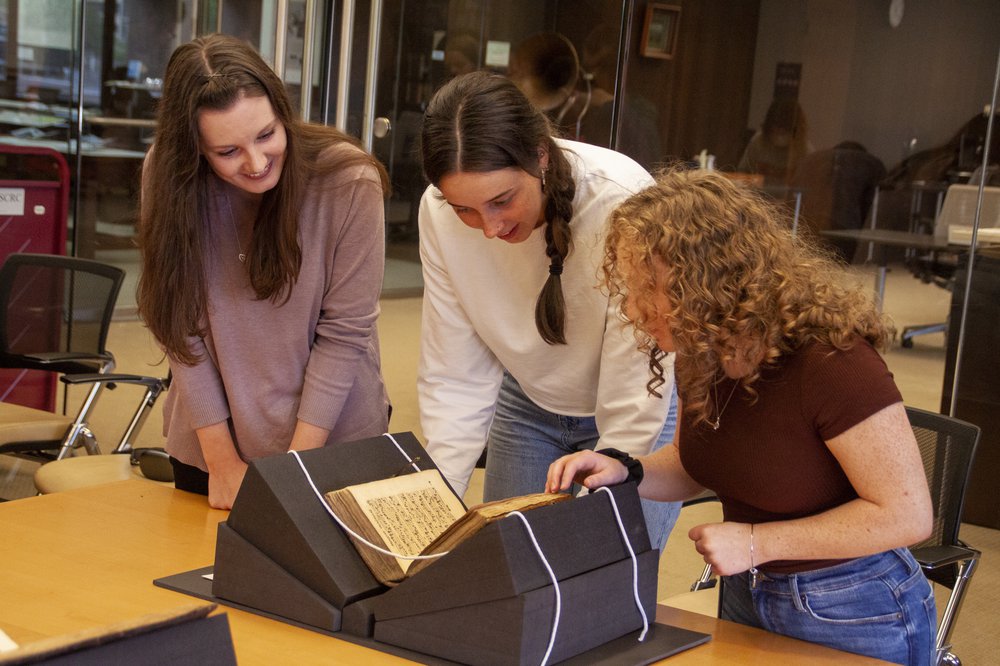SU Libraries’ Instruction Support for Faculty, Instructors and Teaching Assistants (TA’s)

Updated September 15, 2023
by Ronald Figueroa, Michael Pasqualoni and John Stawarz
Whether you're a new teaching assistant or a long-established faculty member, Syracuse University Libraries offer a wide variety of services and resources to support your instruction and improve your students’ learning experiences.
Here are tips and strategies for putting items on course reserve, exploring digital resources such as eBooks from our collections, showing videos in class, supporting students with videos and tutorials about the research process, collaborating with librarians for library instruction sessions and sharing permalinks to online library resources. If you have any questions about these resources and services, or anything else that the Libraries can do to support you and your students, please contact SU Libraries or your subject librarian.
Course Reserves, Request, Delivery and Interlibrary Loan
Placing materials on course reserves allows more students to use course reserve materials at the same time and provides easier access. The Libraries generally provide course reserves materials electronically so that all students, both on and off campus, can easily access materials. When an electronic version of a resource is not available, we will provide access to physical course reserves. Please submit your course reserve request several weeks prior to the start of the semester. Requests are generally processed in the order received and are typically completed within 1-2 days unless the item needs to be recalled or purchased. You can also contact our course reserves team (reserve@syr.edu) for assistance.
Additional services include interlibrary loan, which can obtain materials needed for individual research that are not available in Syracuse University Libraries. Typical turnaround for a book is 5 to 7 days. Our Articles-to-Go-Services provides electronic delivery of articles or book chapters scanned from the Libraries' collection. The typical turnaround for scans is 24 to 48 hours. Both services can be requested through our Request, Delivery and Interlibrary Loan Portal. You can also contact our interlibrary loan team (ill@syr.edu) for assistance.
Users can submit a hold request for physical items in our catalog, such as books and DVDs, by clicking on “Request this item” on the item’s catalog page for pickup at one of our library locations. Finally, our Library-to-Go service provides delivery and pick-up services of library and interlibrary loan materials to faculty and graduate students to their respective academic department office mailbox. You can register by sending an email to delivery@syr.edu. Please include your name, department and building.
Showing Videos in Class
The Libraries offer video content that supports the teaching, research, and creative needs of the campus community. You can discover and explore videos through several locations on the library website, including dozens of video databases and our Special Collections Research Center.
If you’re not able to find in our collection a video that you’d like to show in class or make available to your students, please contact your subject librarian or fill out the Suggest a Title form, and we’ll quickly try to license or acquire the additional video content. Please note, however, that not all videos can be licensed by the library, including original content created by Netflix and Hulu. Librarians also encourage faculty and students making use of video in classes or research to visit our Video Guide.
Finding Online and Digital Resources
The library’s website is a powerful intersection of general search engines and lists of databases, journals and research guides. These can be retrieved by title, subject discipline or by types of content.
Faculty, Teaching Assistants or students seeking greater depth of relevant results will usually encounter their best outcomes if they complement use of the top-level search box with advanced Libraries Search strategies. Not all the licensed databases a research library supports are directly compatible with top level library search engines. Especially when working with source material that involves video or statistical data or sound recordings or business research, be sure to browse lists of available library databases, which are sortable by relevant subject areas or by types of content each database contains (e.g., video, statistics, news, eBooks, audio, images, patents, etc.). Or navigate to specific journals, by individual title or sorted into discipline specific groupings.
Linking to the Libraries’ Online Resources
Rather than uploading pdfs of articles and other materials to your course website, linking to the library’s online resources provides permanent and stable links for students to gain access (even when off campus), supports best copyright practices and allows Syracuse University Libraries to more accurately assess which resources are being used. For additional information about linking to library resources, please visit our guide on Linking to SU Libraries' Online Resources or contact the library for assistance.
Instructional Support and Resources
Libraries' staff are available to provide instruction either in-person or virtually, on library resources and services, online research databases, the research process and subject-specific collections and research skills. Instruction is delivered by a diverse team of librarians and School of Information Studies graduate students who teach in a multitude of spaces, employ a variety of pedagogical approaches and reach a wide range of student populations. Depending on your course goals, instruction can take place in several modalities. To schedule a library instruction session, please contact your subject librarian or complete the instruction request form.
Syracuse University Libraries also offer a wide variety of asynchronous online resources to support student learning. Our online research guides serve as great starting points for students in every academic area, and we also offer guides for both specific courses and a wide variety of broader topics, such as citing sources, finding primary sources, research metrics, and resources for writing your dissertation or thesis. We also encourage you to share with your students information about our online videos and tutorials explaining and demonstrating the research process, and awareness of our Learn! at SU Libraries workshop series.
